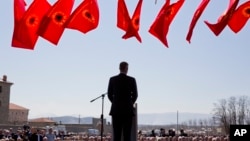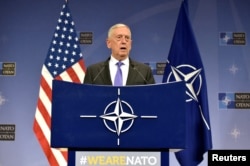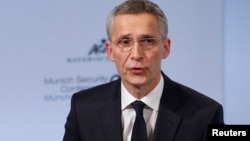On April 4th, 2019, NATO members will mark the 70th anniversary of the signing of the North Atlantic Treaty — part of a successful effort to contain Soviet expansionism and to cajole the war-torn nations of Western Europe to forsake ancient enmities and to forge solidarity.
But for the transatlantic alliance to continue, Europe will have to make a greater contribution and share more of the burden, warn analysts.
After the collapse of the Soviet Union, NATO appeared uncertain about what part to play, but the return of Russian assertiveness under President Vladimir Putin has partly changed that — and the alliance’s supporters say NATO’s traditional role of collective security has never been more important.
Nonetheless, the U.S.-European alliance has been shaken by President Donald Trump’s episodic questioning of the very value of the transatlantic pact in periodically bruising encounters with European leaders and using tweets or brusque off-the-cuff remarks to do so.
The resignation in December of U.S. Defense Secretary Jim Mattis highlighted strained ties between the Trump administration and European allies.
In his resignation letter, the outgoing defense secretary said: “One core belief I have always held is that our strength as a nation is inextricably linked to the strength of our unique and comprehensive system of alliances and partnerships. While the U.S. remains the indispensable nation in the free world, we cannot protect our interests or serve that role effectively without maintaining strong alliances and showing respect to those allies.”
Weeks earlier, Trump suggested he might cut U.S. force levels in Europe, if the European allies didn't boost their military spending. “They kill us with NATO,” Trump said during a speech in Montana. “They kill us,” he repeated.
Last July, during his visit to the annual summit of NATO allies in Brussels, President Trump expressed frustration with German Chancellor Angela Merkel over a planned Russia-to-Germany undersea gas pipeline, saying, “We’re supposed to protect you from Russia, but Germany is making pipeline deals with Russia. You tell me if that’s appropriate. Explain that.”
There have also been sharp disagreements over Iran and the U.S. decision to withdraw from a landmark nuclear arms pact with Russia in reaction to alleged cheating by Moscow. Washington has also expressed growing frustration with European partners over what it sees as a lax attitude to Chinese security threats to the West.
Such clashes have added to the uncertainty about the future of NATO, which is founded on a US security guarantee to Europe.
Much of the media coverage on the current strains in the transatlantic relationship focus on President Trump’s characteristically confrontational style. European newspapers have highlighted the U.S. leader’s general distrust of multilateral organizations and his wanting a return of powerful, independent nation states that deal with each other bilaterally rather than via international organizations
But some analysts say the problems with the alliance predate the current American incumbent and at the heart of the strains has been a European reluctance to help to rebalance NATO. “The deeper reasons for the uncertainty go beyond him [Trump],” argues Hans Kundnani of Britain’s Chatham House.
He says Europe has failed to uphold its part of a bargain. Even before Trump was elected there was a consensus in Washington that, as the United States increasingly focuses on Asia, Europe needs to take more responsibility for its own security. Presidents before Trump, including his immediate predecessor, Barack Obama, have also pressed the European members to increase their defense expenditure and to share more of a burden.
“It seems pretty clear that the only way the U.S. security guarantee to Europe might be made sustainable in the long term is for Europeans to make a greater contribution to their own security,” Kundnani argues.
And the U.S. President has his defenders when it comes to his table-thumping approach to NATO — both in the U.S. and Europe — who say Trump's confrontational style may be the only way to shake up the alliance's European members.
Many in Britain's military and intelligence establishments have been supportive of Trump's complaints. A group of eight former British military and intelligence chiefs, who worry Britain could slip from being a “tier one” military power, argued in a newspaper advertisement that the U.S. leader’s criticism of the Europeans (and Canadians) over burden-sharing was valid.
They argued the threats the West faces demand increased military expenditure, even though Britain is one of only four European countries that already meets an agreed two percent of GDP in defense spending.
Combat readiness across the board among European militaries is woefully inadequate.
Last year, the German parliament's military commissioner issued a scathing report on the readiness of Germany's armed forces, noting that only a fraction of crucial weapons systems was operational. At the end of 2017, six out of six of the navy's submarines were out of commission and none of the air force's 14 large transport planes were available for deployment due to repairs. More than 20,000 officer and non-commissioned officer positions were unfilled. Many fighter jets, tanks and ships are outdated or in disrepair, the commissioner noted.
The report urged the government to pursue reforms “with greater urgency” and to increase defense spending.
In the face of U.S. complaints, a division has emerged among European policymakers — between those who argue they must take into greater account U.S. interests in a bid to try to improve strained transatlantic relations and those officials and leaders who want to adopt a more aggressive “Europe First” strategy to counter Trump’s “America First” approach.
French President Emmanuel Macron has advocated ambitiously a Euro-army and talks of Europe needing to free itself from military dependence on America. But both Britain and Germany are deeply skeptical of Macron’s idea for such an army. Skeptics say such an army could never make up for American military might and its importance for European defense. Others point out that it would end up with European governments having to increase their spending dramatically.
Central European states much closer to Russia place greater faith in an American security guarantee than one from their Western neighbors — for good historical reasons, they say. And despite Trump’s sharp criticism of NATO’s European members, they note, Washington remains committed to expanding a military presence in the Black Sea, the Baltic states and Poland and supporting Ukraine in its conflict with Russia.
On Monday, NATO Secretary-General Jens Stoltenberg announced an agreement to invest $260 million to fund a military storage site in central Poland in support of U.S. forces that operate in the region. “This will fund storage and maintenance of pre-positioned military equipment — which will speed up reinforcement for Europe,” Stoltenberg said during a news conference at the alliance’s Brussels headquarters.






